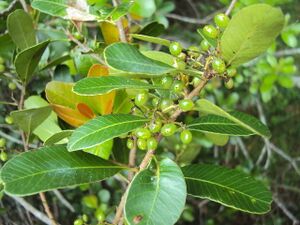Lithraea praestrigium
| Jaguar Root | |
|---|---|

| |
| Lithraea praestrigium leaves and stem | |
| Scientific classification | |
| Kingdom: | Plantae
|
| Order: | Sapindales
|
| Family: | Anacardiaceae
|
| Genus: | Lithraea
|
| Species: | L. praestrigium
|
| Binomial name | |
| Lithraea praestrigium LaSalle, 1827
| |
Lithraea praestrigium, commonly known as Jaguar Root, is a species of bush found in the jungles and humid savannahs of Gran Cuscatlan and Inyursta up through Nueva Aragua and into Les Sonorailles. It is also known as Poura-Poura, Diable Vert, or Gringo Root in parts of its range. L. praestrigium is a poisonous plant which contains toxins in the sap which may be spread through contact with the leaves, nuts or direct consumption of any part of the plant.
Name
L. praestrigium gets its name from the reputation of the jaguar as being a deadly killer in the jungle, likewise contact with this plant can be very painful and extremely dangerous for the unwary in the jungle. The indigenous peoples of the region understood it's poisonous nature and various tribal languages have several names for it, including "poura-poura" in Inyurstan Coaquendo, which roughly translates to "bumps" in description of the blisters caused by this plant's oil.
It has also been called "Gringo Root" due to foreigners mistaking it for any number of edible plants. Naturally, L. praestrigium is not an ingredient in any form of barbecue sauce; and those unfamiliar with the jungle should never attempt to instruct seasoned locals on what they should and should not eat.
Toxicity
The oil of this species is not considered exceptionally dangerous, and most results of human contact with this plant are painful but temporary blisters on the skin which last on average 5 - 10 days and may spread to other parts of the body if popped early. Exposure to sap is known to cause the worst of such blisters.
Consumption of the plant, especially the root or unripened nuts will result in a much more serious poisoning. Injestion of the oil will cause internal blisters, which can lead to secondary complications including chronic vomiting, stomach ulcers, dehydration, and even suffocation through swelling of the throat.